Film Critic Interview: Watching Film Directors with David Thomson
By David D’Arcy
In his new book on film directors, critic David Thomson gives us plenty to think about and plenty more to argue about.
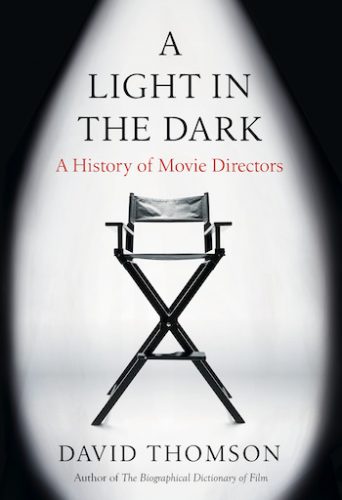
In The Producers, the accountant Leo Bloom (Gene Wilder) says to his conspirator boss Max Bialystok (Zero Mostel), “Actors aren’t animals. They’re human beings,” to which Bialystok responds, “Have you ever eaten with one?” That line was written by the film’s director, Mel Brooks.
David Thomson is not quite echoing Max Bialystok in his new book, and he’s not Mel Brooks, whom he doesn’t mention in his elegant and caustic A Light in the Dark: A History of Movie Directors.
Yet Thomson, author of The Biographical Dictionary of Film, has watched directors being human long enough to have seen them eat and do a lot more, and it’s not always pleasant. He guides us through the careers of a dozen of them and alludes to the work of many dozens more.
And he situates them and their work in history as well as in the present. Filmmakers who have stood the test of time — Fritz Lang, Luis Buñuel — are receding from view. Women, African-Americans, and others who were marginalized or excluded are replacing and overtaking them. Art houses have closed; the audiences that once supported art cinema dies off. Television washes over it all like a tsunami that never recedes, its flow of streaming products written and directed by people whose names you’ll probably never know.
Before the interview, here are some excerpts from A Light in the Dark, evidence that Thomson’s writing rarely disappoints. He gives us plenty to think about and plenty more to argue about.
Fritz Lang is passing into “the shadows” because the audience for his films — outside of academia and the occasional museum retrospective — is dying off. “He was the first searing pessimist in a medium given over to crowd-pleasing and sentimentality. In Germany, at least, he had held to desperate visual poetry as a director’s duty. I suspect the American Lang regarded himself as a failure and he made a lot of films that uphold that view.”
On Jean Renoir, “Orson Welles wrote a fond and discerning obituary for the Los Angeles Times that called him ‘the greatest of all directors.’ In truth, Renoir seemed a more balanced and warmer person than Welles, and a more mature or less vain storyteller.”
On Luis Buñuel, another director in oblivion’s penumbra, “really had no other subject or process than filming ardent faces beholding objects of desire and attempting to balance propriety and abandon.”
“A Natural Liar” is the title of Thomson’s chapter on Howard Hawks: “He never really made a single-minded or unequivocal drama, because he could not help feeling the ridiculous side to solemn matters.”
Psycho (1960) was “a piece of daring in which Hitch put himself up against the staid business…. The fusion of sexuality and violence, and the strange respect for disturbed personality and for dread itself were weather systems that would alter the cultural place of cinema.”
On Orson Welles: “Hitchcock was content to be a kind of devil; Satan as played by Jeeves, perhaps. But Orson Welles always went for broke — God was his natural role. So, at a time when Hollywood was most assured about what a director could and could not do, along came this large kid whose every instinct was to cut across any grain he noticed. Nothing in Orson caused more upset in the picture business than his self-glorification. But Citizen Kane is a story of achievement that goes up in smoke.”
Jean-Luc Godard “is like Marshall McCluhan, in that, growing up in the romantic culture of movie story-telling, he was uncannily aware of (and angry about) the way romance was a commercial-cultural construct of reality being imposed upon us. In short, there was no good reason to believe in movies anymore.”
Nicholas Ray “was ardent and gloomy, creative and self-destructive, and he was a test case at a crucial moment of turmoil in the status of the film director.”
Stephen Frears “has never seemed persuaded that a movie — much less one of his — could change the world. But there are contemporaries who are bursting for that limelight, like Scorsese and Tarantino, who have never given a hint that their films are about anything other than their own obsessiveness.”
Quentin Tarantino’s Pulp Fiction was “a terrific title that showed Tarantino knew he was making an elegy to genre. It was akin to the Hawks of The Big Sleep saying, Look, see what we can do with this material.”
The Piano, directed by Jane Campion, “is one of the more intricate studies of emotional liberty and societal restrictions ever made.”
Arts Fuse: When did American audiences start paying attention to movie directors? Did it start in the late ’30s or the ’40s, when Howard Hawks and Preston Sturges were working?
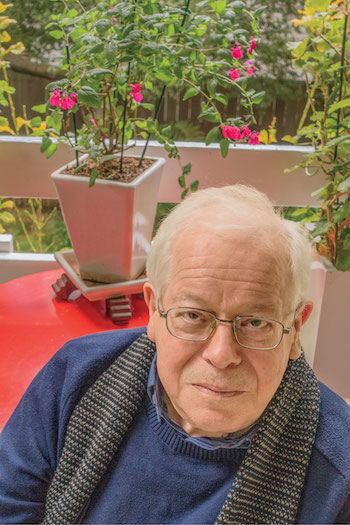
David Thomson. Photo: Lucy Gray.
David Thomson: I don’t think the audience was onto directors. If you go back to that era, Cecil B. DeMille was known, partly because he had done some rather big, rather bad films, but he was known as a rather reckless, adventurous director. Hitchcock clearly introduced a very new, special kind of personality for a director. He was not a very appealing person, but he made films that had a unique tension, suspense, voyeurism in them. And I think people did begin to recognize what a Hitchcock film was. And he was so cunning that he helped that feeling along by putting a cameo of himself in every film. So he became a known and somewhat comic figure. That is, he didn’t have any of the von Stroheim or Hawks-ian glamour of a director. He was almost the last person on earth you might have imagined making a film. But you watch several Hitchcock films, and you see his cameos, and you begin to identify him. Woody Allen, the same way. Allen was an actor in public before he was a director. Then we began to see that Allen films had this persistently neurotic, absurd figure in them, which was Woody. He was the director and the actor, he was the auteur, clearly.
A lot of very good, competent directors were not known to the public at all. They didn’t care. People went to see their movies for the actors.
AF: There is a famous response from producer Scott Rudin when he was asked “Well, what is this film about?” He retorted, “This is a film about two movie stars.”
Thomson: Yes. Time and again, that is one of the best definitions of a movie that you can come up with. And if you take a fairly good film, certainly a classic for its time, Butch Cassidy and the Sundance Kid, hardly anyone knows who directed it or cares.
AF: Was it George Roy Hill?
Thomson: Yes, it was. George Roy who?
AF: But you also cite Bonnie and Clyde, and you say that this is Warren Beatty’s movie, right?
Thomson: Absolutely.
AF: Tell that to Arthur Penn [the director, 1922-2010].
Thomson: I talked to Penn about that. He was a very sweet man, and a pretty honest guy. He was proud of Bonnie and Clyde, and there was a lot in the film that he put there. But he knew all along, and he would admit it, that he was serving Beatty’s vision. And that film would not have happened if Beatty hadn’t wanted it to happen.
AF: I remember Penn telling me that first they wanted to get Jean-Luc Godard to direct it and then they tried to get François Truffaut.
Thomson: Absolutely. Truffaut and Godard were both lined up as potential directors for it because the screenwriters, Robert Benton and David Newman, wrote their script very much under the influence of French New Wave films. Truffaut came close to directing it, I think. But he couldn’t have done it, if only because Truffaut spoke terrible English. It’s a film where people talk, as well as shoot each other.
AF: Can we address another problem? The audience is becoming younger and less aware of film history. Specialized film students are mostly interested in happenings post-Scorsese. You mention a pupil in a film class who didn’t know who Cary Grant is. Doesn’t that point to a problem?
Thomson: People don’t know history any more. And we’re going to have to face the fact that that history is going to sink into the swamp. You can point at Turner Classic Movies and say “Isn’t that wonderful” to have TCM around and be able watch these great films. It has done a great service. But the average age of the viewership for those films is a warning bell, because those people are dying out. I don’t think they’re going to be replaced. I don’t think a younger generation is going to come along in sufficient numbers to want to see those old films over and over again.
AF: So the joke might be — what’s older, the films on Turner Classic Movies, or the people watching them?
Thomson: That’s right.
AF: How about Billy Wilder?
Thomson: Wilder is one of the omissions in this book that I feel worst about. I was working within a certain length for the publishers, and so I had to choose. I wanted to write at reasonable length about my subjects and that there could be 10 chapters. That meant that some people were going to be left out. And Wilder is certainly one of them that I regret the most. I also left out Ridley Scott, who I also think is a pretty good director.
AF: Ridley Scott would have been interesting because the auteur snobs are loath to recognize him for the director that he is.
Thomson: Exactly. I sort of did that with the Stephen Frears chapter. There again, he is not somebody whom the auteurists emphasize, the way they do David Fincher and James Gray. I would still like to write sometime on how good Ridley Scott is.
AF: Think of the end of Some Like It Hot, with Joe E. Brown wooing Jack Lemmon. It’s as ahead of its time as the corporate meeting of mobsters is, where they are just saying, “Hey, I’ve got 12 percent here” and “50 percent here” — where the mob is another by-the-numbers business.
Thomson: Absolutely. You’re totally correct about Wilder. He has every reason to feel upset and if he were here, he would say so too.
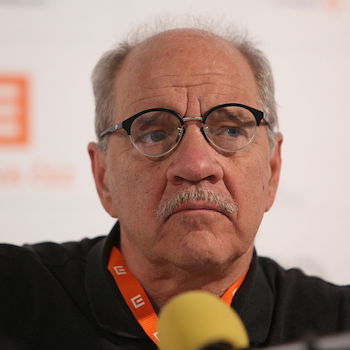
Director Paul Schrader — the last of the moralists? Photo: Wiki Common.
AF: If we are talking about omissions, what about Paul Schrader? He was already established as Quentin Tarantino, to whom you devote an unflattering chapter, was becoming a huge presence. Schrader was a reality check, a morality check, a super-ego. There haven’t been many like him in the generations that have followed. Of course, I’d love to be proven wrong on this one, but where are the moralists?
Thomson: I totally agree. I admire him very much. Schrader is inconsistent, but who cares? He’s probably got half a dozen films that are really good and important. And he’s been true to what he began with — a kind of slightly humorless but intense spiritual feeling about his characters. If someone were to say to me that next year there will be a new Scorsese film and a new Schrader film, and asked which I had the higher hopes for, I would say the Schrader film.
AF: In the epilogue, where you mention books on the directors you discuss, part of what comes up again and again is the dearth of really penetrating biographies. How do these directors manage to control their own stories? Why do biographers get it right, but only up to a point?
Thomson: The movie business is a very closed club, and there’s an agreement — it’s a gentleman’s agreement, but it applies to the women too — that you’re not going to squeal, you’re not going to turn them in. And when you get them up on stage, or when you get them in front of a microphone, they can’t say too many nice things about the people they work with.
Well, if you’re ever on a set, and if you’re ever close enough to their personal lives, you know that they do not feel so warmly about each other. They’re a very competitive, very selfish brand of creative person. But the real truth about how they have dealt with each other does not get out.
And, of course, for a long time, film directors did not take themselves seriously enough to keep archives. That has changed. Even film directors know now that you can probably sell your archives somewhere or other, so long as you go through it carefully — sort out the incriminating stuff — before you sell it and hand it over. But there is not a great deal on paper that you can really use.
Yet if you want to do a biography of a writer in the period we’re talking about, the chances are they left a lot on paper. It’s in archives, so you can really build a study of their lives. With a lot of film directors, it’s very hard to come by equivalent materials.
AF: What about Sam Wasson’s new book, The Big Goodbye: Chinatown and the Last Years of Hollywood?
Thomson: I know a little bit about that film and I know some of the people involved. A great deal didn’t get into Wasson’s book. But that’s understandable because a lot of these people are still around. It’s very difficult these days for people to come clean about director Roman Polanski and about Nicholson, who is an adored figure. He’s not doing terribly well now, so people don’t want to offend and trouble him. Robert Towne [the screenwriter) is alive still and has always been a very crafty fabulist of his own career. It’s very difficult to pin down the making of a film. You remember Lillian Ross’s book Picture [1952]? That was a groundbreaking book because director John Huston allowed her to be there at every meeting and every day of shooting on that film [The Red Badge of Courage]. She was shrewd enough to realize that all she needed to do was sit in a corner, be unobtrusive, and write down what everyone said. And when she printed that, it would be staggering, and it was. Because nobody had realized that that was the way movie people talked and thought about things. It’s very difficult to get on a set in that way nowadays.
People who have been in or made a film almost have a script that they bring to interviews, a formalized, approved version of what happened. Whereas you probably know enough from what you picked up to know that it’s very far from the truth. But you can’t print the truth because it will threaten your access to these people. And, for that sort of writer about film, you have to preserve your access. Which means, a lot of the time, you have to reprint what they want to believe happened. And that makes what really happened a lot harder to unearth.
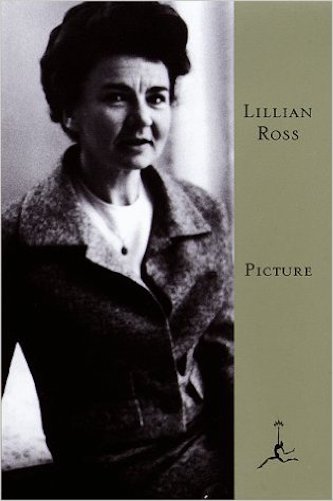
AF: You use some version of the word “human” or “humanizing,” to refer to an ideal blend of directorial humility in the face of success. What director can you cite who may have achieved something like a healthy balance?
Thomson: There’s one big reason that I like three directors in this book and their work. Essentially, it is because they like people. Jean Renoir, Howard Hawks, and Stephen Frears fit that bill. A lot of film directors, because they work in genres where the norm is to encourage pulling people apart, don’t like people so much so much.
Hitchcock did not really like or trust people. That emerges over time in his work. As he gets more commercial confidence, he gets nastier toward his own characters. James Stewart in Rear Window, is OK. He’s a pleasant enough, bearable guy. And the romance with Grace Kelly is one you want to have work. But by the time you get to Vertigo, which is only a few years later, Stewart has become totally neurotic. And, as Hitchcock grew older, his characters became more and more neurotic, which I think is a reflection of his own self-awareness.
AF: Why would his own self-awareness make his characters more neurotic? He wasn’t writing those scripts.
Thomson: Well, no, except that Hitchcock regularly sat in with the writer as the scripts were being done. I wouldn’t say always, but a lot of the time Hitchcock’s hand on the screenwriting process was quite strong, quite heavy.
Hitchcock, as a young man, I think, was sort of lower-middle-class, not very well educated in anything except film, very insecure in the sense that he was overweight, and unattractive by most conventional standards. And yet, consumed with lust and ambition, he wanted to become famous and rich, wanted to sleep with his actresses, but never had the nerve until he got to a point of the extraordinary success of Psycho. Then he felt he could break free from all the inhibitions he had. The problem was, by then, he was too old. He was still overweight and he’d lost touch with the change in censorship. Hitchcock is a man who depended on censorship, just as a Peeping Tom depends on the fact that what he is doing is illegal. Once films were free to look at naked people and things like that, and to show extensive violence, the ground was taken out from under his feet.
You think of a film like Frenzy [1972], where in theory he’s taking advantage of the breakdown of censorship. In fact, he loses his touch completely and becomes a very awkward and rather oppressively cruel director.
AF: You barely mention Steven Spielberg in the book, and what you say about him is mostly dismissive.
Thomson: Spielberg is a wonderful professional. He’s probably, or naturally, a producer, rather than a director, but he’s made a ton of very entertaining films. It’s just that, when you look back on them, they don’t have enough creative personality. I don’t really know what turns him on beyond the trick of making successful films.
There are a few exceptions. I think Empire of the Sun is his best, a great film of J.G. Ballard’s book, but a lot of that is due to the phenomenal Christian Bale, age 12, giving one of the most astonishing child performances in the history of film. I admire Spielberg for what he’s done, but I feel a little detached from him.
I could say the same about George Lucas. Spielberg and Lucas were crucial figures in reinventing smash-hit commercial cinema, and they were both a little cold-blooded about it.
AF: Let’s talk about Mank for a moment, since we’ve bemoaned the eroding appreciation of history among younger audiences and filmmakers. I found it monotonous, bordering on monochrome, and I couldn’t sit through it.
Thomson: You’ve said monotonous. Its look is arty, pretentious, and fussy. There is a very interesting story in how Kane got written, which is almost completely ignored and overlooked in Mank. It is very hard to find people who like the film. At the Golden Globes, I think I’m right in saying, it received more nominations than any other film, and it didn’t win a thing. And I suspect that’s going to be repeated at the Oscars, because I don’t think people like the film. There’s a lot of advertising behind it, but I still don’t think it’s having any impact on people’s resistance. If you asked me to say something good about Mank, Amanda Seyfried is about the only thing I could come up with. She’s lemony. I like her in the film. I like her as an actress.
Gary Oldman is just flat-out awful. As I said, I cannot find people who like the film. I cannot find people who defend it.
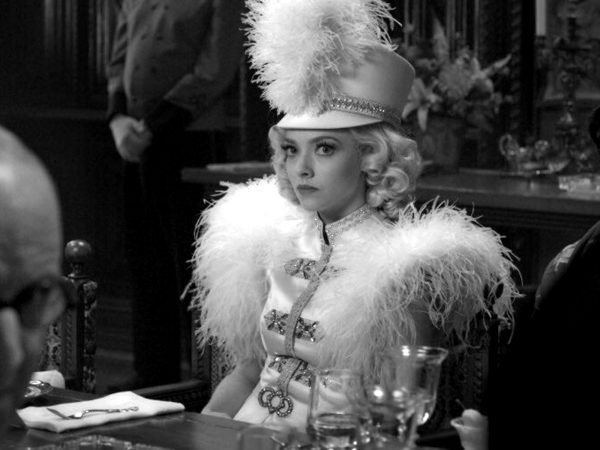
Amanda Seyfried in Mank. Photo: IMDB
AF: In A Light in the Dark, you mention what films were nominated for awards over the years, what films and directors were ignored. Any thoughts about the upcoming Oscars?
Thomson: I don’t think anything should win. What should happen is that we should terminate the Oscars. They’re a totally boring event. I don’t think the public is interested in them. I do have a certain dark hope, which is about the big Chadwick Boseman talk for best actor — he’s very good, but I don’t think he’s on the level of Anthony Hopkins in The Father.
I’ll make a prediction. People are saying Boseman’s going to win, but they’re actually going to vote for Hopkins. We’ll see.
AF: What do you find encouraging about movies that are being made today?
Thomson: The most encouraging thing is that they’re being made by people who not too long ago would not have been able to make films. One way or another they’re getting out there, they’re getting screened, and it’s becoming a much more democratic medium.
AF: OK. What’s the story about how Kane got written that Mank left behind?
Thomson: Welles had carte blanche but he couldn’t deliver a script himself. Because, genius as he was, he couldn’t write at that level. He became very angry about it, and he used to quarrel with John Houseman, the crucial figure in his life. And then Welles found Mankiewicz, and he thought that maybe Mankiewicz could write it. Mankiewicz had a broken leg, and had to go off to the desert to rest up. Houseman was sent with him. I think that what happened there is that Houseman fed Mankiewicz a lot of stories about — and insight into — Orson. Citizen Kane isn’t about William Randolph Hearst, it’s about George Orson Welles. That story is a really great story and it could have been something special. Houseman is present in Mank, but he doesn’t have a significant part.
David D’Arcy, who lives in New York, is a programmer for the Haifa International Film Festival in Israel. He writes about art for many publications, including the Art Newspaper. He produced and co-wrote the documentary Portrait of Wally (2012), about the fight over a Nazi-looted painting found at the Museum of Modern Art in Manhattan.
Tagged: A Light in the Dark: A History of Movie Directors, David Thomson
